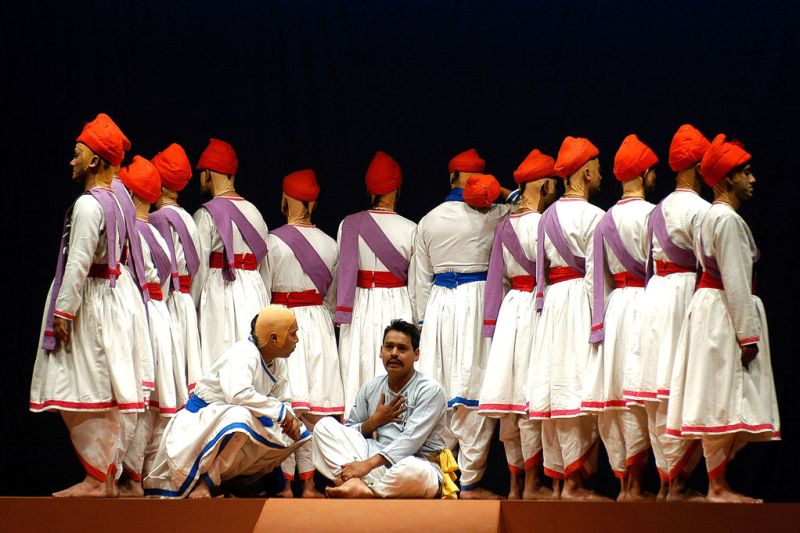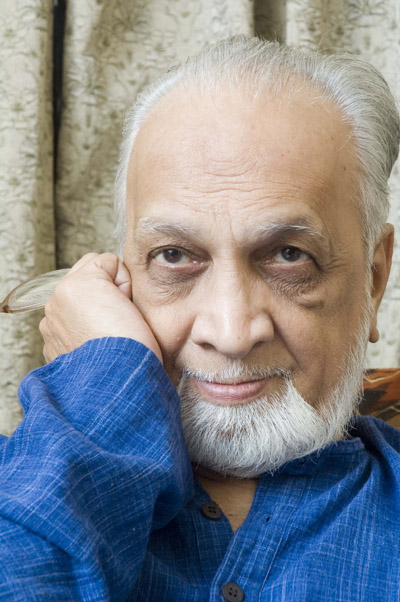|

"Ghasiram Kotwal" Drama Presented in The National Theater Fest
|
|
Vijay Tendulkar – Ushering in new sensibilities
|
When one partakes Vijay Tendulkar’s plays, political undercurrents become perceptible before audience’s inner eyes, great moral and philosophical questions disturb your conscience, glory of powerful and afflictions of meek inflict the stage, perhaps a wee bit violently; and one is feasted to a grand ensemble of history, politics, philosophy, ethics and above all, life.
Vijay Dhondopant Tendulkar was arguably the first political playwright in India, of reckoning. Tendulkar authored twenty seven full-length plays and twenty five one-act plays. More than five of his plays attained classical status in Marathi theatre. Many of his plays were translated into several Indian languages and got staged.In his works, he split open the political hegemony of the powerful and the |
|
hypocrisies of Indian psyche. Tendulkar’s hard hitting utterance of human angst brought in large public acclaim and animosity of orthodox and political bigwigs, too, with that. Life blessed him with bounty of experiences of struggle, which Tendulkar made into his strong points, while writing.
His life in tenements in Mumbai opened up him to first-hand experience of the life of urban lower middle class. This enabled him to bring an authenticity, never attained before, in their depiction in Marathi theatre. Tendulkar’s writings revolutionized the themes and concerns of modern Marathi Theatre in the 1950s and 60s. Theatre groups like Rangayan contributed much with their experimental presentations of Tendulkar’s plays.
|
|
|
|
Thespians like Shriram Lagoo, Mohan Agashe and Sulabha Deshpande of these theatre groups aided a lot by bringing in novel authenticity and power to Tendulkar’s storylines.They transformed the sensibilities of Marathi Theatre. The play ‘Gidhade’ (Vulture), written in 1961 proved to be a turning point in his writing career by marking the germination of his own unique writing style. The play was also emblematic of his main theme – violence. In his ensuing works, he continued with his indulgence with the theme of violence – domestic, sexual, communal and political.‘Shantata! Court Chalu Aahe’ (Silence! The Court is in Session) was the play that catapulted Vijay Tendulkar into national fame.
It is rated as one of his finest works and was staged for the first time in 1967. In an eminent critic’s words – in this play “male dominant politics assumes a legalistic pose in the setting of a theatric game”. On hindsight, this can be termed as the first significant drama in Indian theatre to have feminist moorings. In 1971, Satyadev Dubey made a movie out of it, with Tendulkar himself writing the screenplay.
Vijay Tendulkar’s another acclaimed play,’Sakharam Binder’ was written in 1971. This can also be considered another play with feminist implications. The theme of ‘Sakharam Binder’ is the domination of the male gender over female.
After ‘Shantata! Court Chalu Aahe’ and ‘Sakharam Binder’ – the third major play of Vijay Tendulkar is ‘Ghasiram Kotwal’. In this play, the seriousness of ‘Shantata! Court Chalu Aahe’ and lighthearted fantasy of plays like ‘
|
|
Ashi Pakhrey Yeti’, which show Tendulkar’s versatility, converge and acquire a form of the rumbustious musical, armed with a plane of irony. With performances numbering over six thousand in its original and translated versions, ‘Ghasiram Kotwal’ is among one of the longest running plays in the history of Indian theatre. Vijay Tendulkar was awarded with Sangeet Natak Akademi Award in 1970 and its highest award – the fellowship was bestowed in 1998. In 1984, he received the Padma Bhushan award from Government of India. Tendulkar won the National Film Award for Best Screenplay for the movie, Manthan, in 1977.
Vijay Tendulkar was born on sixth January of 1928 in Kolhapur of Maharashtra. His writing career spanned for over five decades. He passed away on 19th May, 2008.
He has translated nine novels, two biographies and five plays by other authors into Marathi.
|
 |
|
|
